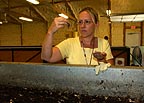August 24, 2006
'Worm farm' open house set for Friday at SIUC
CARBONDALE, Ill. -- In addition to the thousands of students who converged on campus for the fall semester, Southern Illinois University Carbondale is now home to 2 million red wriggler earthworms.
Campus and community members can learn more about the University's new vermicomposting facility during an open house at 9 a.m. on Friday, Aug. 25. The facility is at 3373 W. Pleasant Hill Road, just west of McLafferty Road.
The red wriggler worms, known for their appetites, are gorging daily on 1,200 pounds of food waste in a 4,692-square-foot insulated pole barn along Pleasant Hill Road. They will produce a compost that is very rich in nitrous phosphorous, and the organic nutrient additive could complement existing mineral fertilizers, according to researchers.
The project, funded through a combination of state and county grants, is the first application of a university using vermicomposting in Illinois, said Andilee M. Warner, SIUC's recycling and solid waste coordinator.
___________________________________________________________________________
Media Advisory
Reporters and photographers are welcome to attend the open house to learn about the vermicomposting program. The facility is on the north side of West Pleasant Hill Road, just west of McLafferty Road.
___________________________________________________________________________
"I'm excited about the project," Warner said. "After two and a half years from start to now taking the food from the cafeterias, it's a long road but I'm excited we are finally online."
The worms took up residence this summer after completion of the building and the bins that house them. The project started with food waste from the Student Center and will expand to include food waste and biodegradable fiber products such as napkins and milk cartons from Lentz and Trueblood residence hall cafeterias. The food waste is ground into a dry organic pulp while at the residence halls and is picked up daily.
The College of Agricultural Science's Department of Plant, Soil and Agricultural Systems will conduct field tests on the vermicompost on the potential for vegetable crop and turfgrass growth. In addition to Warner, project investigators are department chair and soil microbiologist Brian P. Klubek, along with Professor She-Kong Chong, Associate Professor Alan Walters and Assistant Professor Jorge D. Hernandez.
The research will examine the amounts of compost to apply, crop and turf grass response, and whether there are nutrient deficiencies to resolve. While some vermicomposting is in use right now for preliminary research, that material is not from the University's facility. Those organic materials will be available in time for spring planting at University Farms, according to Warner.
Recycling food waste and energy efficiency are also important factors within the project. Used motor oil from University vehicles is providing fuel for the furnace to heat the building this winter. At current prices that will save SIUC $93,000 over 10 years, Warner said.
Diverting the material to the vermicomposting facility instead of sending it to the Jackson County Landfill reduces the University's removal costs and increases the landfill's longevity, according to Warner. A commercial shredder, which is part of the grant, is on order. It will help provide a food source for worms when dining facilities are closed, and can provide an alternative document-shredding source for departments on campus, Warner said.
The concrete for the building's foundation utilized a mix that includes 18 percent fly ash from SIUC's fluidized-bed-combustion coal-fired steam plant, utilizing efforts of Y. Paul Chugh, a professor of mining and mineral resources in the College of Engineering, and his staff.
The project includes grant funds from the Illinois Department of Commerce and Economic Opportunity Bureau of Energy and Recycling's Recycling Expansion and Modernization Program, the Jackson County Health Department and the Illinois Department of Agriculture. University partners include the Office of the Provost, Plant and Service Operations, College of Agricultural Sciences and the College of Engineering's Department of Mining and Mineral Resources Engineering and Department of Civil and Environmental Engineering.
Leading in research, scholarly and creative activities is among the goals of Southern at 150: Building Excellence Through Commitment, the blueprint the University is following as it approaches its 150th anniversary in 2019.

Digging into research — Andilee
M. Warner, recycling and solid
waste coordinator at Southern
Illinois University Carbondale,
holds one of the two million red
wriggler worms that researchers
will use to determine potential
applications of vermicompost on
crops and turfgrass. Utilizing
food waste from University
residence halls, the resulting
compost is very rich in nitrous
phosphorous and the organic
nutrient additive could
complement existing mineral
fertilizers. The project is the
first application of a
university using vermicomposting
in the state. An open house at
the new facility is set for Friday.
Download Photo Here
